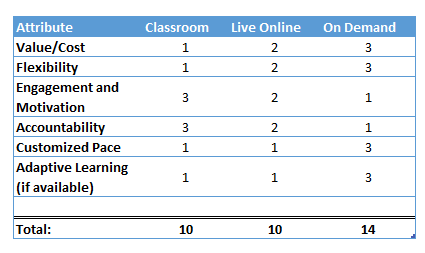How to Choose the Best GMAT Courses
I often get this question from people looking to sign up for a course so instead of writing the same reply over and over, I am summarizing the wisdom here.
Should I take a GMAT Course?
Are you signing up for $84 EMPOWERgmat course, Economist $750 course, or $1,400 Manhattan GMAT Course? You get the gist... Not very easy to answer but if I had to, the quick answer would be - definitely if it does not sabotage your MBA budget.
- Scenario 1: If you are used to hiring tour guides in foreign countries, CPA's for your taxes, or Attorneys for legal help, then getting an in-person prep course or a private tutoring package would be pretty natural for you and will make the experience much more enjoyable (or less unpleasant at least) and you will save a bunch of time.
- Scenario 2: If you have always blazed your own trail then you may study using books or On-Demand Online courses. There are many well priced self paced Online Courses ($85-$299) from EMPOWERgmat, eGMAT, Math Revolution, Target Test Prep. that can help you ace both Quant and Verbal Section in a month. At the same time for the same amount, you can also purchase the MGMAT or Veritas set of books that even though take slightly longer but are equally effective in helping you get a high score.
- Scenario 3: You are not sure. This is where over 50% of the folks fall in. The proliferation of self-paced courses and competition in this category (sub-$99) really made it tough for this group. It is absolutely possible to score 750 with any of the online courses reviewed on GMAT Club or using books from either Kaplan (that's what I have used Kaplan Premier + Verbal Workbook + Math Workbook), MGMAT Book Bundle, or Veritas Prep Books. You need to decided what can make you more successful as there is really no price difference between the approaches. Not any more. Are you a better learner with a book or a video? Do you do better with exercises in a book or on the screen? Many courses have free trials (Full list of GMAT Free Trials) that will allow you to take them for a week or two before you have to pay.
What Course Attributes Should I Consider?
Here are the most important elements (the order may be different for you):
- Course Reviews by previous test-takers. GMAT Club has a very extensive collection of GMAT course reviews. Look for the negative one but discard the "silly" and "annoying" ones where a person clearly did not do the work. If it does not scare you away, it is a good course! Check the instructor reviews as well - we have those too!
- What is your format? - are you signing up for a classroom, live online, or on demand course? These have a different level of engagement and a different price point. The in-person ones are most expensive due to rent and a limited class size; this will provide you with the best opportunity to control the speed you are moving through the course and most opportunities to ask questions and interact. If you are taking an in-person or live-online course make sure that you will have enough face time and it is not a crowded class. Meanwhile on-demand classes will allow you to choose your time and place. See more below a comparison
- What are you getting with the course?
- In-person and Traditional courses from Kaplan, Veritas Prep, and MGMAT will provide you with their book bundles and often even the Official Guide
- Self-paced and online courses tend to offer all of their resources online these days, saving you money, and taking advantage of additional features and functionality (you can and should still get the Official Guide)
- How many tests are you getting? It is usually not critical since you can get MGMAT CAT's with a purchase of any of their $17 books.
- Are you getting enough exercises and practice questions? If you are getting fewer than 1,000 questions, make sure your areas are covered. With larger question banks you should be just fine
- Is the system the course provider using adaptive in any way? Does it provide feedback if you fail or have a hard time with some question types? For in-person and Live courses, does someone review your progress and how often?
- Instructor experience and skills: Who is the instructor? What are his scores? Would you like his explanations? Take a look at the instructor ratings on GMAT Club. Many instructors are also active on GMAT Club. Take a look at their responses, articles etc. to see if you like the style of the instructor.
- How long is the course? - understand how many hours and sessions you will get.
- Does your Course actually cover what you need? Request a syllabus/sample schedule to figure out what exactly is covered. In some cases, if your score is lopsided, for example, you will be better off if hire a tutor for the problem area and cover the rest on your own. Don't take a whole course to only realize that 3 out of the 27 hours cover your weak spots. Also, there is a number of dedicated courses such as eGMAT's SC/CR/RC sections - these on-demand mini-courses will allow you to focus on your weaknesses.
- Score or Money Back Guarantee - what are the terms? Study these carefully and make sure you meet the conditions! Some courses (Magoosh require you to send in your score report before you start the course in order to qualify). This is a very important item for retakers. Many courses will offer a 50 or 70-point money back guarantee (e.g. Knewton, Economist, and Magoosh) and if you have scored 700 and want to improve your score, you ultimately can take a free course, unless you get a 750 or higher, which I am sure you will be happy with either outcome :wink:
Self-prep vs. a GMAT Course
Advantages of GMAT Courses:- Cuts down your research time
- Motivates or Forces you (there is a schedule you have to keep and deadlines for homework)
- Interactive - course or instructor will provide feedback on your performance and suggest corrective actions
- Structures your preparation into modules and sections
- Provides all necessary materials
- Gives you access to an instructor (or support staff if taking an on-demand class) to answer your questions and support you along the way
- Removes the noise and helps you focus on what's important for the test and score (instructors can advise what's tested, where they see most issues, and where to pay the most attention)
- Provides all the benefits of self-study (nobody said you can't do both though you really don't need to)
- Hands down a course, esp. in-person course is the best way to go
Advantages of Self-Study- Allows mixing materials across the board
- Used to be cheaper but not clear any more with sub $100 courses
- No schedules (you don't have to wait for a class to start if it is in-person or live online)
How to Get the Most out of Your Course
If you take a course, make sure you do it right. If you are not serious, don't take a course - spend money on something more practical such as video games or lottery. Here is how you do it right:
- Dedicate time to the course and homework - GMAT Courses are intense. Be prepared to sit for 3 hours and do 6 hours of homework. You cannot just show up and expect great results. You have to study, remember, practice over and over again. This is the biggest reason for failing to take advantage of a course. Not doing homework, not having enough time, or not having energy to do it. Many decide to take a course and then really study once they are done with classes - that's pretty dumb. Avoid it. You have to commit, whatever it takes you.
- Stay on top of the material - if you do not understand something after a class, reread your books/manuals/etc and try to figure it out. If you can't ask for help from your instructor. Do not delay and think that you can figure it out later - it will only get harder and you will drown even more as time goes by. Do not delay questions.
- Work hard - you are hiring an instructor/course to teach you. They will only be there for so long. You can get a lot higher ROI if you work hard and get as much out of them as possible. If you are poor (like most of us), this is your way to save money

- Be in control of your learning - if you are having an issue with learning, understanding, instructor, or anything - express it in email or conversation with the instructor or the company. It will save you a lot of headache later on.
Overview of Money Back Guarantees - Great for Retakers!
1.
Magoosh - priced at $249 with 50-point guarantee. The exact
guarantee terms are here2.
eGMAT - priced at $549 offers a 7-day free trial and a 120-point guarantee. The
exact terms are here3. The Economist GMAT Tutor - priced at $799+ and comes with either 50 or 70 point money back guarantee. The
exact terms are here. This course provides flexible and lenient terms and does not require you to have taken the GMAT prior.
4. Math Revolution - offers a Quant Score guarantee (they only offer a quant course) with
5-point guarantee and a 7-day satisfaction guarantee refund option5.
EMPOWERgmat -
Winner! priced at $84 - has one of the best policies with a
70-point score guarantee. Take a peek - you can even get an hour of Admissions Consulting!
6.
Target Test Prep - offers a 5-day Free Trial and
Quant Score guaranteeClassroom vs. Live Online vs. On Demand
This comparison will be different based on your priorities. I recommend using a table like this and also utilize a multiplier to take your priorities into consideration - e.g. if Flexibility is your key driver, multiply that line by 2x or 3x. Build a spreadsheet like that - I am attaching my simple one.
Attachment:
 2014-02-19_2237.png [ 9.96 KiB | Viewed 145301 times ]
2014-02-19_2237.png [ 9.96 KiB | Viewed 145301 times ]
Private Tutoring vs. GMAT CoursesMore Pros and Cons of online, on demand, and in person classesNeed help choosing a course?
Let me know and I will be happy to help you pick the best course for you!
P.S. When I speak about GMAT Courses, I am referring to reputable companies that are
present on GMAT Club. There obviously others but I cannot vouch for them.

![]() Course Comparision.xlsx [10.08 KiB]
Course Comparision.xlsx [10.08 KiB] 


